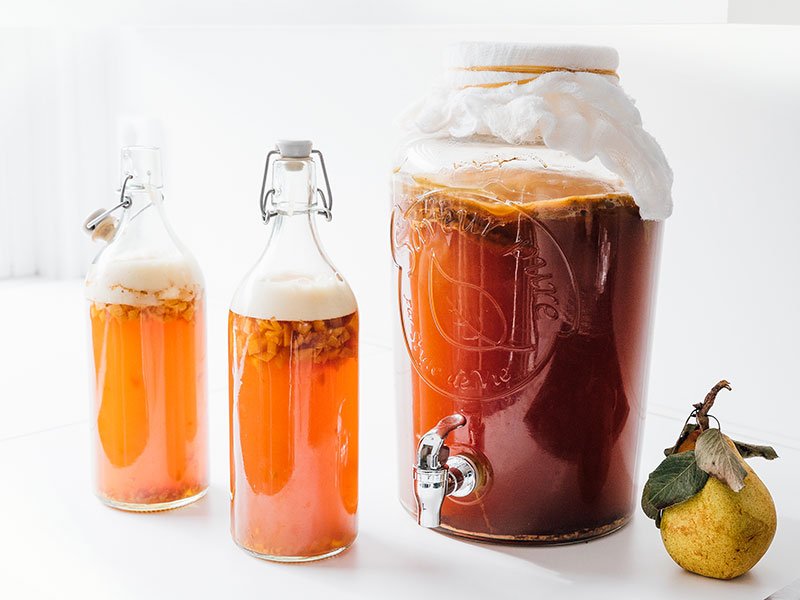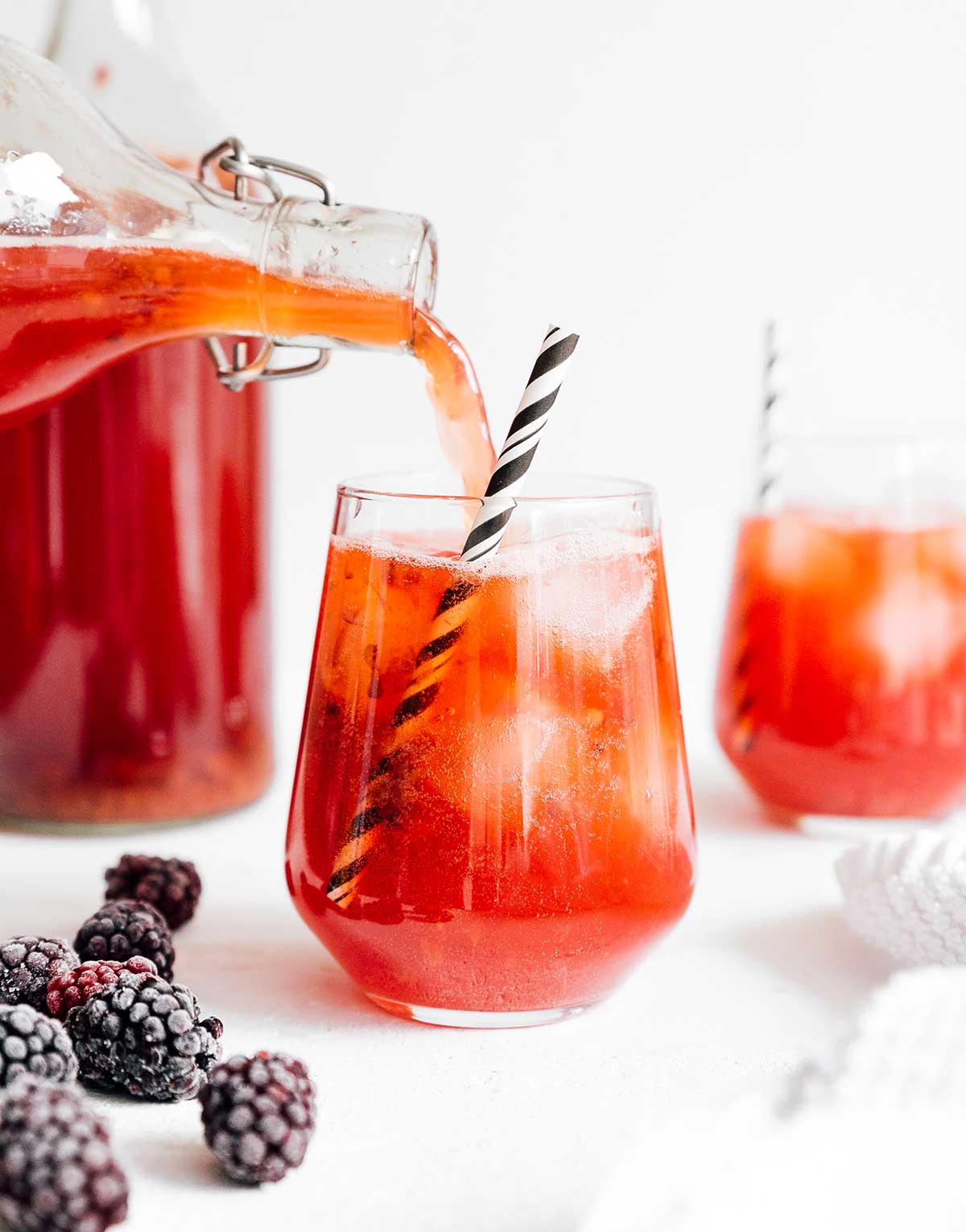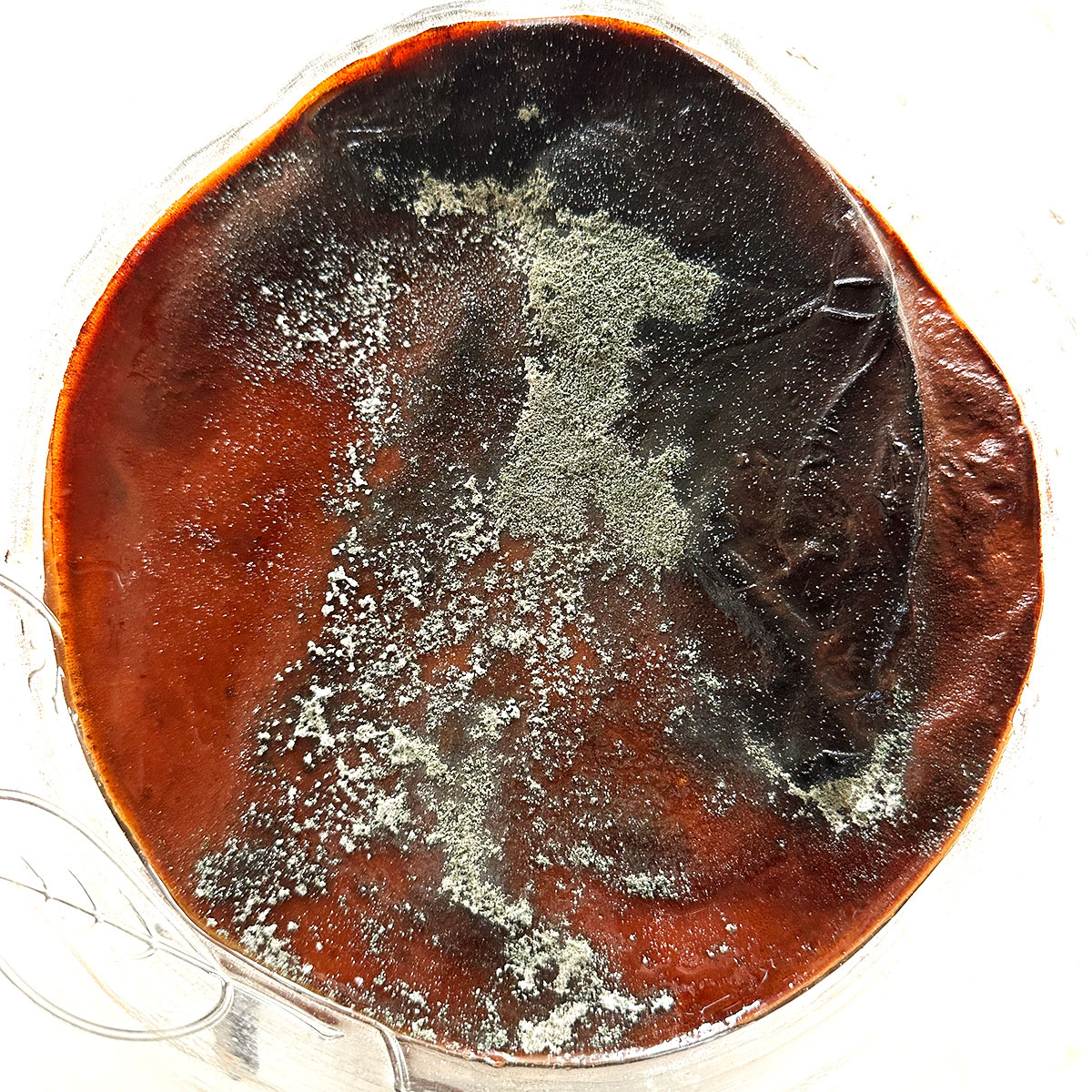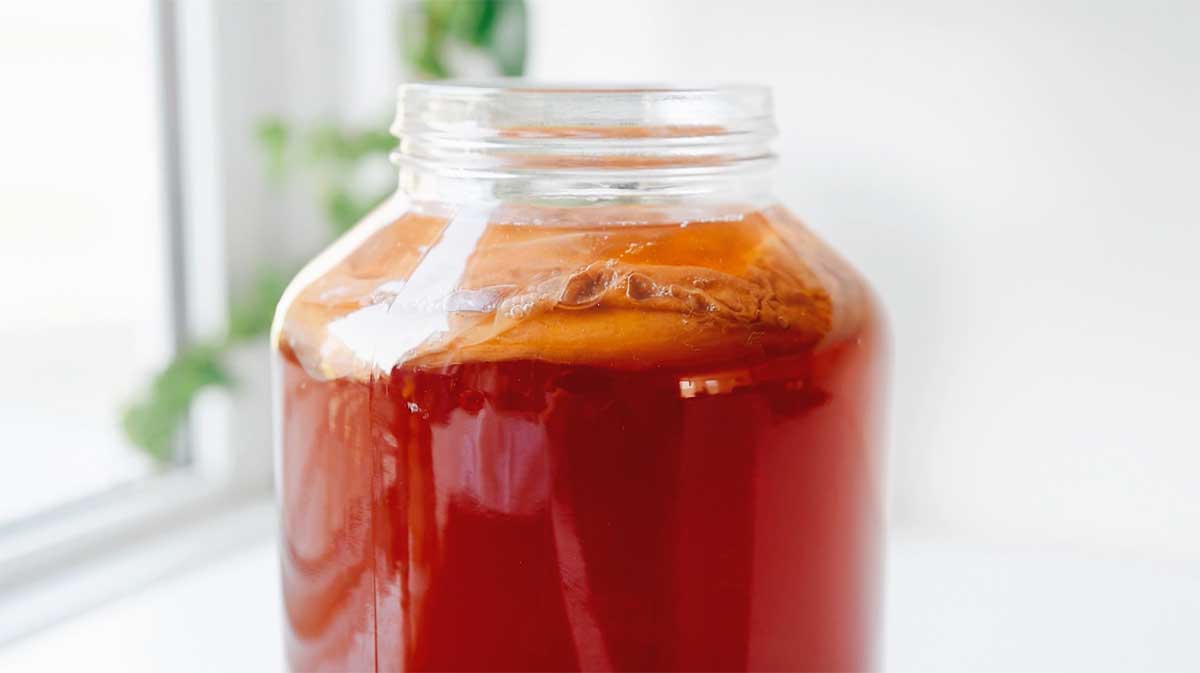You may have seen the expiration date on a bottle of store bought kombucha and wondered, how long does kombucha last? Answering all your kombucha expiration date questions here!

In order to understand how long kombucha will last (and if it goes bad), it’s important to understand what kombucha even is!
At its core, this fizzy drink is fermented tea. Specific bacteria and yeasts (known as a SCOBY) are added to sweet tea, which is then transformed by these microbes into the kombucha we know and love! (Learn how to make kombucha here).
As the SCOBY eats the sugars in the tea, the kombucha becomes acidic (which gives it that distinct tart taste). When the kombucha has reached the perfect level of tartness, it is bottled (and often carbonated) then refrigerated.
Refrigerating the kombucha slows down the fermentation dramatically, meaning the SCOBY virtually stops the reaction and the kombucha can be stored without changing flavor anymore. Which brings us to the question of the hour – how long does kombucha last?

How long does bottled kombucha last?
Due to the acidity and presence of good bacteria and yeast, there should be no “bad bacteria” or mold in the kombucha. This means it can safely be stored in the refrigerator for many months – generally 6 to 8 months. (Even the fruit in kombucha should stay good!)
Note that if you store the kombucha outside of the refrigerator, the fermentation will continue to make the kombucha more acidic, to the point where it becomes vinegar. While this is not unsafe to drink and also has a very long shelf-life, it won’t be nearly as tasty!
So why do store bought brands of kombucha have a “Best By” or “Sell By” date on the bottle? While not required by federal law, many companies are part of the Grocery Manufacturers Association and the Food Marketing Institute, which require an expiration date to be printed on the bottle. Kombucha is generally safe to drink, even after the expiration date (though it may be more tart, and you should always use your best judgement when it comes to any off flavors or smells).

How long does an open bottle last?
Once you pop open a bottle of kombucha, either from the store or homemade, it may lose carbonation. You can leave it outside of the fridge for a day or two – sealed in its bottle – to rebuild carbonation, then place it back in thee fridge.
Opened bottles of kombucha may have a shorter shelf life, especially if bacteria have been introduced (like from your mouth while drinking).

How do I know if kombucha has gone bad?
While it is not common for kombucha to go bad in the second fermentation (i.e. when it is in an airtight bottle), here are some tips for determining if your kombucha has gone bad:
- Mold, which is usually fizzy and colored, is a sign that your kombucha has gone bad. See pictures of kombucha mold here.
- Vinegary or overly tart kombucha is simply over fermented. It is safe to drink, but not very tasty.
- Floaties or brown stringy things floating in the kombucha are normal. These are strands of yeast, a natural component in kombucha.
What happens if you drink bad kombucha? Read more on the side effects of kombucha here.
Wondering how long a kombucha SCOBY lasts? Answers this way!


is kombucha still good to drink if you go keto cause of sugar in it? will it raise insulin levels alot?thanks
I actually have a whole article on that here that will help you out! Basically, the longer you brew it, the more sugar will be removed from the kombucha making it more keto friendly.
Hi Sarah
I had a batch of kombucha that I fermented with lime juice for about a week. I poured myself a glass and out flopped a Scoby, is this Scoby ok to brew with or should I toss it out?
I’ve been brewing Kombucha for about a year. Your web site helped me understand the brewing process a little more in depth.
Just toss that one out because it’s been exposed to flavorings! Or throw it into a smoothie 😀
I am curious where you derive the shelf life of 6-8 months from, and what the context is? Are we talking raw kombucha with no preservatives in glass bottles, perhaps with fruit blended into it, and at what fridge temperature?
Can you share a little on your experience here?
Correct, raw kombucha has tons of healthy bacteria and yeast that, along with the high acidity, should prevent mold or bad bacteria from growing. This is from my own experience with brewing, fridge set between 35° and 38°F (or 1.7 to 3.3°C).
Well the more I get familiar with you information and your website the more impressed I become with you Sarah. Your incites into the ways to prepare and use this process are stellar to say the least.
So one of your comments was to start using the Scoby as part of the nutritional intake…like in a smoothie…can you do that with fresh or frozen fruit and then let it ferment for a day or two before ingestion? Any experience with that…should it be a wet slurry or can it be a heavy fruity mass? I have fresh tree ripening figs that I am considering using this way and seems like letting them turn into a fermented pudding might be quite delicious? Any thoughts?
Dave
Yes I think that would work! Add a bit of kombucha in there too to liquify it. Curious how it turns out!
How do I know when the fermentation has put enough bacteria in my brew? I don’t like it fizzy,I prefer it flat, how do I achieve this.
You’ll know by the flavor! If it’s got the balance of tangy and sweet that you like after the first fermentation, it’s done 🙂
how could I use it after the second fermentation without having the fruit in it but also without losing the carbonation?
I like to strain the fruit out right before I drink it!
I began brewing buch last year during Spring. By the time Autumn came I had ceased making the buch. I left my Rubys (scoby) as they were, no maintenance no observation. It is now nine days shy of one year, much to my surprise… The jugs are not moldy messes! There are additional Rubys, several, looking as healthy as can be. My question, what are the odds of using those yr old Rubys (well, the newest ones at the top) in new buch without some undesirable flavour transfer?
Thanks in advance for any helpful information!
It could work! It’ll be super potent starter but I think the flavors will be okay!
I had 1/4C of ginger buch from last year in the fridge. Tasted today, such a delicate and delicious flavor, yet vinegary. I want to use it to partially flavor 2nd ferment of a new buch. Questions-is it still alive after this long? Could I use it for a starter? Also, will it kill my 2nd ferment?
It shouldn’t kill your 2nd ferment, and it could be alive still! Just bring it back to room temp to get the bacteria and yeast awake again 😀
I have new problem when brewing my kombucha. It’s liquid feel a little thick(viscous). Do you ever experience this case? Is it safe to consume? Or i must toss it out and starting with new starter tea? Is it getting Sick or something? It taste like normal kombucha& it smell normal too, but slightly slimy when i drink it. ????????
It sounds like you might just have another SCOBY developing! Sounds all normal to me 😀
Do all of these rules apply to hard kombucha as well? Or are they more volatile because of the alcohol?
Love the site! Thank you!
I’m honestly not sure, Gregory, that’s a great question! I would think the same would hold true for hard?
I bought hard kombucha in spring, it’s been refrigerated, at room temperature and then refrigerated again for the last three weeks. Going on 17 days of refrigeration. Is it still good to drink?
It could be okay, but always use your judgement based on smell and taste!
Hi. I am on my second batch or second first fermentation with my original Scoby which I bought from you mid June. I made my first batch then saved two cups and the scoby plus the additional one that had grown and filled my gallon mason jar again following the same instructions from the starter and scoby you sent me. I am now a week into batch 2, first ferment. And I can’t seem to get the ph lower than 4. The colors seem to hover around 4 and have been stuck there for a week. Is this batch bad and has the kombucha gone bad based on hovering at 4.5-4 for a week? Could it be the ph strips that I bought aren’t sensitive enough? I tested with lemon and it seemed to give me an odd reading. But let’s assume for arguments sake that the ph isn’t low enough. What next? I added one tbs of white vinegar on day 1. Advice?
I wouldn’t worry too much about the pH, especially if it’s throwing some weird readings! Going based on the taste is your best bet 😀
I have been making kombucha successfully for years.
Just now however, the scoby on top of my gallon of kombucha has developed mold. I threw out the scoby, but I wonder if I can safely drink the kombucha.
I probably wouldn’t! Those mold spores can get into the brew, even if you can’t see them anymore.
What a brilliant site . You have answered all my questions perfectly .
Many thanks .
I shall Carry on brewing and enjoying my elixir of gut health .
I had kombucha in my refrigerator. Had a power failure for about 3 days. Is my kombucha still good?
It should be good still, but it may have started fermenting again (i.e. may be a bit more sour / vinegary). As always, check for any signs of mold before drinking.
hello, if the kombucha (after the fermentation stopped) is directly in touch with the saliva (our mouth), you said that it will shorter its life span, do you know how long exactly it will last?
thank you
It’s really hard to say, as it depends on temperature and environment! I’d say about a week.
Hello,
3 days into my first fermentation, mother accidentally puts the batch into the refridgerator — if i bring back out and let it rise to room temp again, will ferment continue? Or is the batch ruined??
Yep, it should continue once warmed back up! 😀
What happens if you buy a refrigerated kombucha, then it goes to room temp for a few days and put back in the fridge without ever opening it; is it still ok to drink?! Or does it skunk like alcohol?
It should be okay to drink, but I wouldn’t recommend doing this. Leaving it at room temp will restart the fermentation, which can cause the bottle to explode.
Can u heat store bought kombucha n drink like hot tea?
You can, but it will kill many of the beneficial probiotics in the kombucha.
Hi! i have a stomach problem that is aggravated by fizzy drinks . can i leave a bottle of kombucha open on the side to de carbonise it?
Definitely! You can even gently shake and carefully open to quickly remove the carbonation.
My kombucha has been left in my living room for about a week. Should it still be good?
Yep it should be fine! 😀
I have a couple if gallons of kambucha in a glass fermenting jar that has been sitting approx. 8 months. The temperature has not been over 72. It has been mostly in the 60’s. Is it safe to use this kambucha, bottle it & go for the 2nd fermentation?
Yes it should be! But as always, use your best judgment based on the taste and smell of the buch.
Hi Sarah, after first fermentation I’ve have put my kombucha in a big glass bottle in the fridge . Can I make second fermentation each time I need? I mean, open the bottle as many times I need to take the necessary to make second fermentation?
Thank you
Sol
Yep you sure can! 😀
When the Kombucha bottle says “should not be unrefrigerated for an extended period of time” how long is this. If the Kombucha is out unrefrigerated for four hours in a long car ride, is it still good?
Hi William! Yes after 4 hours it should be fine. This time limit is not so much about being safe to drink, but more about explosion risk. When kombucha is left out at room temperature, it begins to ferment again and produce carbonation. If it goes too long like this, the pressure will become too much and the glass can break or explode. 4 hours shouldn’t be a problem though 😀
I don’t know why my scoby can not floating in the kombucha?
This is totally normal! I wrote a bit about why that happens here 😀